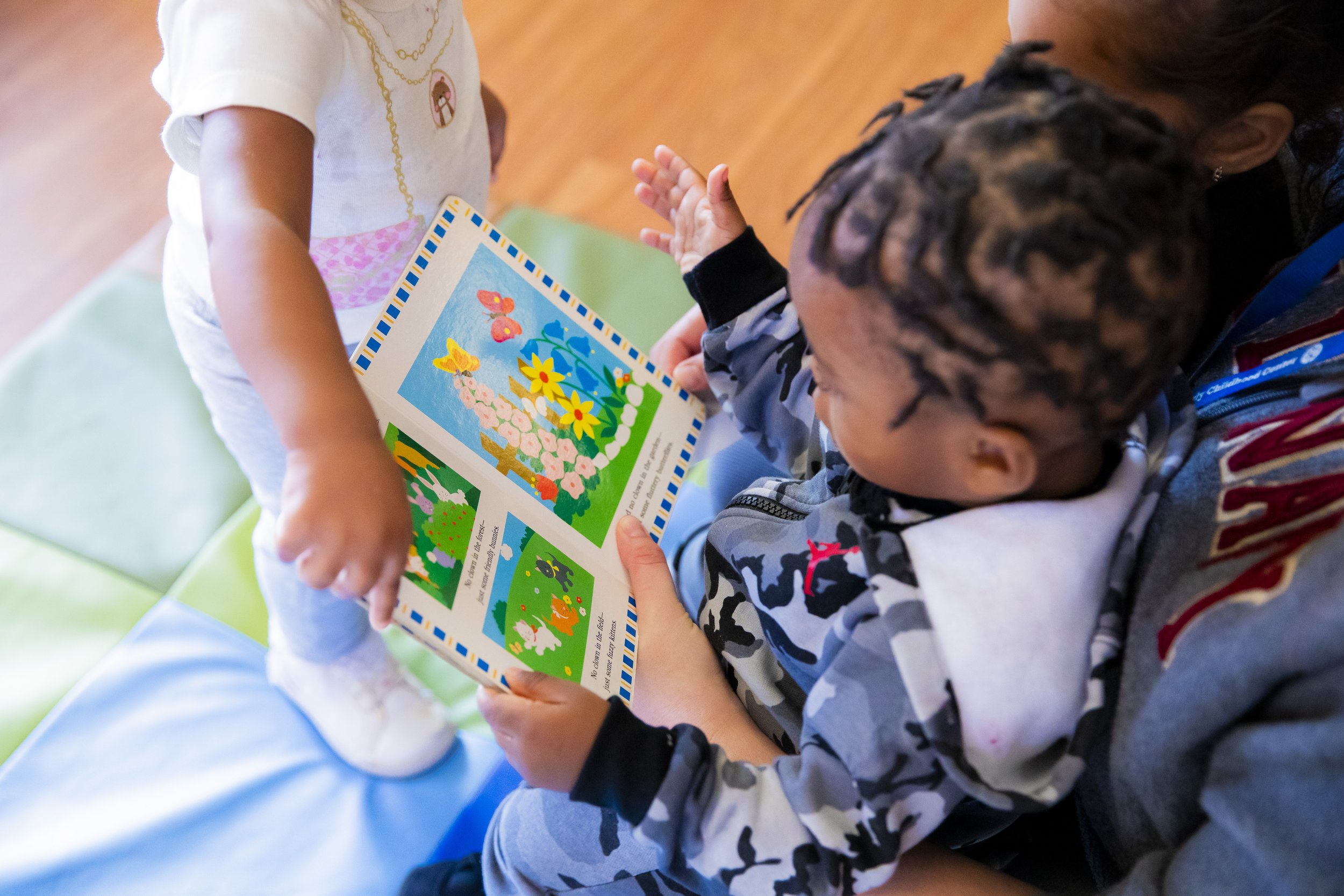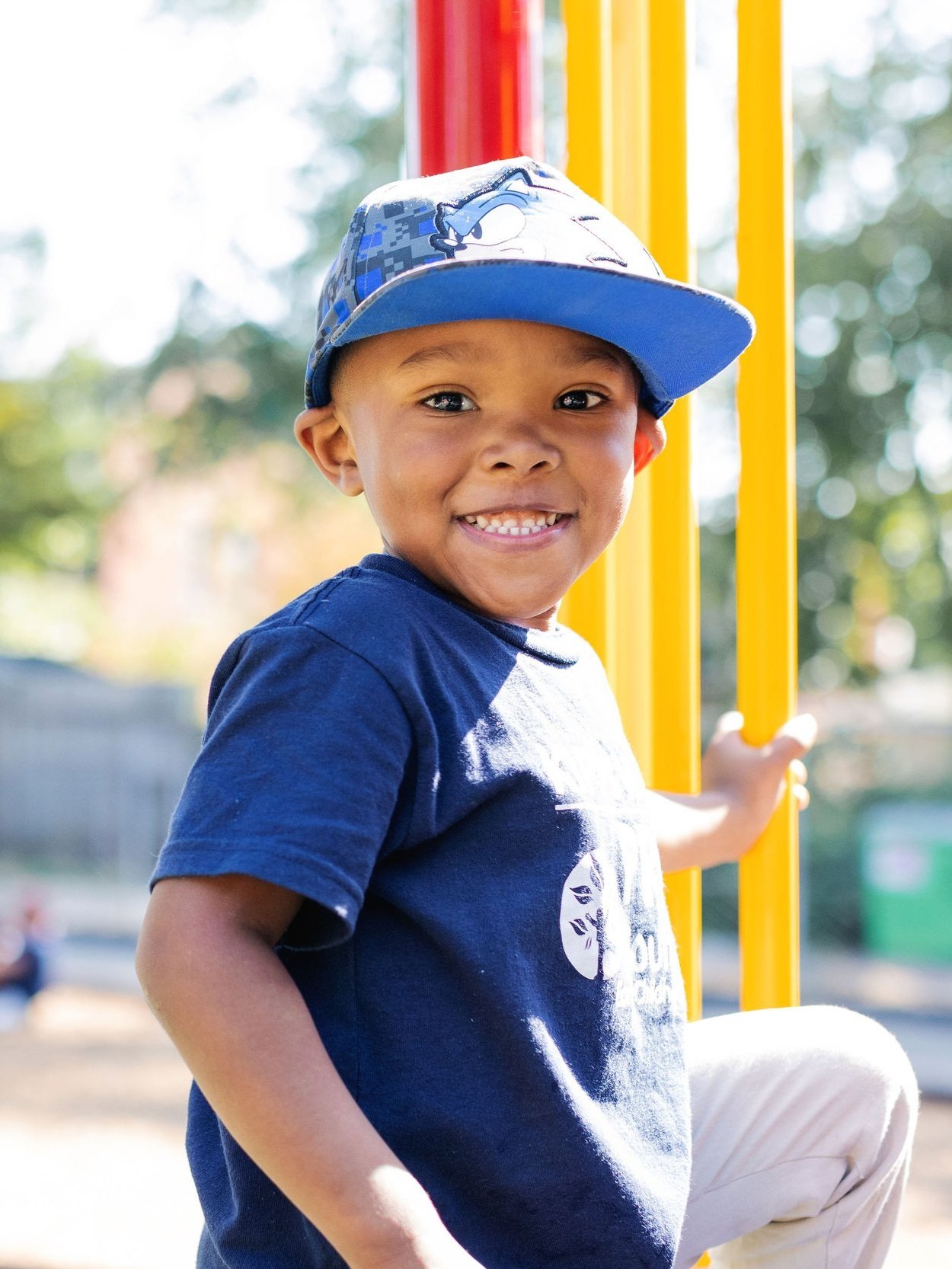
Approach
With a firm footing in research and academic advancements, our work is grounded by a core set of principles, strategies, and values that ensure we provide the best in early childhood education.
We know that a better, brighter future starts now, one child at a time.
Principles
Our guiding principles root our work, shape our strategies, and influence how we prioritize a child’s complex developing world.
Responsive Interactions
How a child’s brain forms in the earliest years of life is directly impacted by the kinds of interactions the child does—or does not—receive. Communication and social skills are developed in large part by how a caregiver responds to babbling, cooing, or crying. Responsive interactions support healthy brain development and include the use of words, eye contact, or physical touch, like a hug.
Reduction of Stress
Families living in poverty experience stress at toxic levels. The impact of this stress can last a lifetime, causing developmental delays in childhood and serious health issues, like heart disease and depression, in adulthood. Our Family Partnership Team works to reduce stress through one on one case management, parenting support and play therapy.
Executive Function Skills
In order for anyone to succeed, they must be able to focus, prioritize, and set goals in an increasingly chaotic world. By supporting the development of executive function and self-regulation skills, we equip kids to do exactly that. Building executive function skills in children is one of the surest ways to benefit families and society as a whole.
P-KOF
At SouthSide, we use the Pre-Kindergarten Observation Form (P-KOF) to assess the preparedness of children to smoothly transition into kindergarten. P-KOF measures four factors of readiness: Motor Skills, Self-Regulation, Social Expression, and Kindergarten Academics.
Strategies
Our strategies influence the programs we develop and how we develop them. Our programs evolve and change, and we are constantly seeking to innovate.
Classroom Instruction
What looks like play in our classrooms is really the opportunity to develop social and cognitive skills. We do this by surrounding our students with highly-trained, responsive teachers.
Professional Development
Education doesn’t stop with our students and families. SouthSide teachers have access to ongoing professional development to ensure continuous growth and engagement.
Family Partnership
Through our Family Partnership program, parents have access to the services and support they need to best care for their children, including parent programming, family engagement, and case management. We believe that families who are treated with dignity as equal partners are the foundation of building a strong future for kids.
Desired Results Developmental Program (DRDP)
The DRDP assessment instruments are designed for teachers to observe, document, and reflect on the learning, development, and progress of children, 0–12 years of age, who are enrolled in early care and education programs and before- and after-school programs. The assessment results allow teachers to plan curriculum for individual children and groups. It also guides continuous program improvement.
At SouthSide, all children are screened with the DRDP assessment to determine a baseline for their development. The DRDP is a strength-based assessment that takes into account the wide range of typical development at any age by offering positive descriptions of children’s knowledge and skills across a broad continua of development and learning. Children are screened 3–4 times during the program year.
Ages & Stages Questionnaires
At SouthSide, teachers and parents use the Ages & Stages Questionnaire (ASQ-3) and Ages & Stages Questionnaire-Social Emotional (ASQ:SE-2) as screening tools for all children ages 6 weeks through 5 years. ASQ helps set individual goals for children and assists in supporting their development. This screening tool also helps measure progress, identify strengths, and uncover any areas of concern. We know that early intervention can be the difference between a child being left behind and leading the way.
Social-Emotional Development
Cognitive Development
Values
By listening deeply, living out our mission as lifelong learners, and championing strengths, we lift up the families we serve--and they lift us up, too.
Continuous Reflection
Our work never stops. If we can do better, we must do better. Continuous reflection promotes innovation and staves off complacency.
Racial Equity Lens
We’re working towards a racially equitable society where challenges, opportunities, and resources aren’t determined by race. To do this, we seek to understand how inequity affects every facet of life.
Inclusion of Parent Voices
Parents are our partners. We need to hear their voices, stories, hopes, and concerns to create a future that includes not just the success of their children, but of them as well.
Research-Based
We know what creates high quality early childhood education. We don’t guess or dawdle in the abstract. We use research to inform our practices, and rely on brain science to provide the best for our kids.
Strengths-Based
Everyone has strengths—abilities, talents, or ways of understanding that are far more powerful than any deficit. We focus on strengths, and nurture and expand them.
Kindergarten Transition Results
Both parents and teachers responded that SouthSide graduates are well-prepared for Kindergarten!
Adrian’s Story
Adrian was born at 23 weeks, weighing 1 lb 5oz. When he joined Southside, his family had concerns about his ability to walk and talk, along with meeting developmental milestones. When Adrian first started school, he had a hard time adjusting to being away from his family. He cried all day and would not let his classroom teachers put him down.
Today, Adrian walks throughout the building, talking and playing with friends. He even tries to open doors by himself when he walks to class. On the playground, he loves to play the xylophone—and he loves playing basketball in the gross motor room!
Our Programs
“School readiness” for Kindergarten and beyond is critical. Each day, SouthSide kids take part in carefully planned experiences that promote their interest and growth in literacy, art, mathematics, science, social studies, music and movement.



